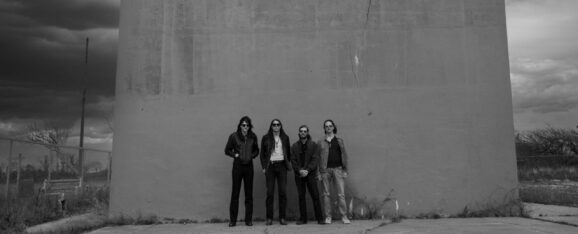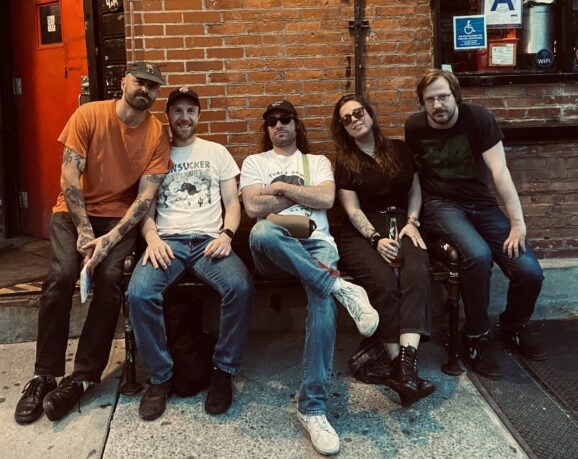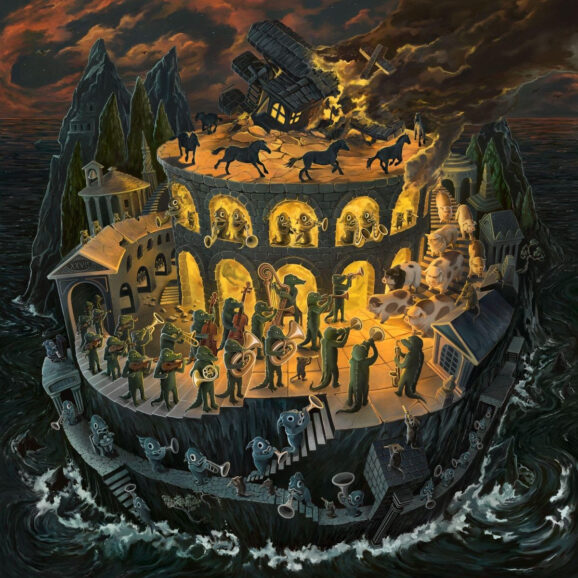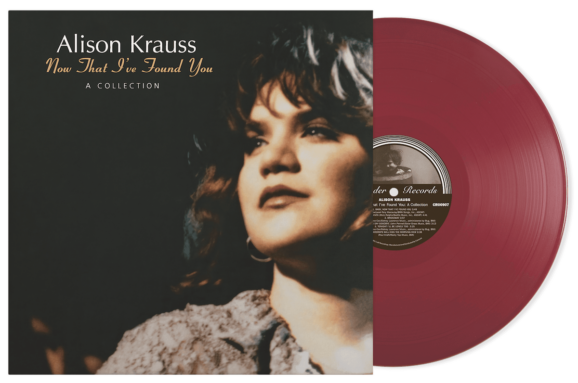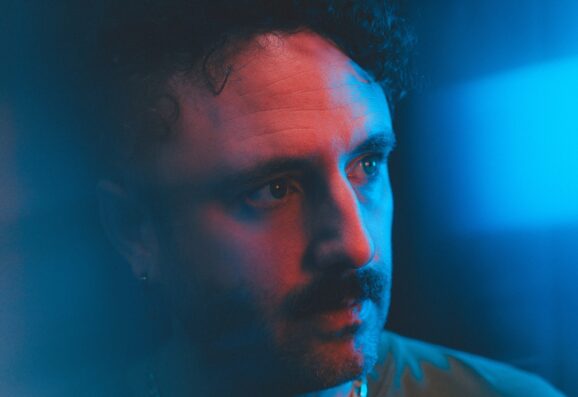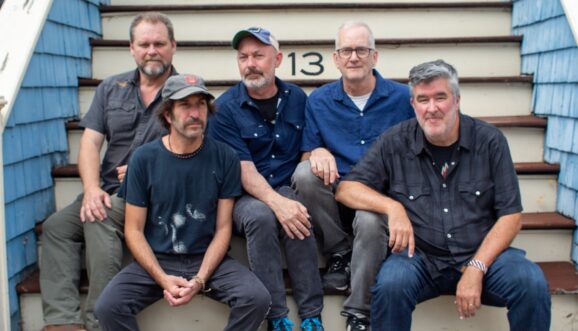Beth Bombara has announced her album, It All Goes Up, which will arrive on August 4th via Black Mesa Records. It’s a record where Bombara has particularly noted certain elements of difference in comparison to her previous album, Evergreen, both in sound and theme. Since it’s decidedly a set of songs that derive from a time and place in her life, they address some ideas in common, like isolation and disruption, but they also have a common sound experiment at their root, explorations on a classical guitar. Bombara rediscovered the instrument during the same period of creativity and found that picking that kind of guitar up for the first time in over ten years led to a different sonic structure still discernible even when some of the songs were translated to electric guitar.
The upshot for audiences is a greater spaciousness in the songs, a certain restraint in terms of lyrics, and a greater attention to instrumental expression and vocal choices to convey emotion and mood. Together with Bombara’s already established focus on emotive lyrics, the songs on It All Goes Up create a very moody and interesting sound world to explore. Many of those moods and emotions may also be particularly relatable for audiences who have been through similar periods of reflection in recent years.
We’re delighted to premier Beth Bombara’s track “Lonely Walls” on Glide today, a song that represents the forthcoming album very well in terms of guitar-focused instrumentation, space for an immersive experience, and themes of isolation. I spoke with Bombara about “Lonely Walls”, about the arrival of the classical guitar as an influence, and about the wider sonic choices we’ll find on It All Goes Up.
Hannah Means-Shannon: I understand that you did more writing on the guitar for the songs on It All Goes Up versus your previous album Evergreen. I can hear some differences between the approach on the two albums and I’m wondering how much of an impact you think that had.
Beth Bombara: Definitely, that’s a big difference. Sometimes I intentionally write on different instruments, but a lot of times, it’s a natural, organic progression. I’ve written on guitar a lot, but I hadn’t touched this classical guitar in maybe ten years. I sort of reconnected with it and it was a different tone. It feels way different, even than a steel-string acoustic. Most of the songs on Evergreen were written on electric guitar. The difference shaped the songs on It All Goes Up, including the sound and the vibe.
HMS: Does the classical guitar go back to studying music for you, or your experiences playing in other bands?
BB: It’s funny, I joined my first band when I was 16 and I don’t think there’s a time in my life since then that I’ve not been in a band. [Laughs] It’s just always been part of my life. I wanted to dig a little deeper into it, so I did study music in college, but I didn’t really fit into that whole world. Most other kids I was in school with were into Jazz or orchestral music. I didn’t know what I was doing but I was having fun with it. I pursued classical guitar briefly, just for one semester, so that’s why I bought that guitar. That was my student guitar. After that, I put it away and didn’t touch it for ten years, at least. That was a really sweet thing to come back to and it really drew the songs out of me for this record.
HMS: Do you have a sense of what pushed you to pick it up? Was it the entrapment of the pandemic?
BB: Partially. There was reorganizing closets and rearranging furniture. I was poking through a closet and found it and pulled it out. It’s amazing how one instrument connects with you in a different way and really informs you.
HMS: I notice more nuance in the sonic range on these songs and there’s also plenty of room for the guitar parts. They get a lot of space.
BB: Definitely. Even though a lot of the songs were written on classical guitar for the record, when I brought the songs to my band, some of them were still played on the classical guitar, but for some of them I said, “I wrote this song classical, but I think with the band in this context, I’m hearing it on electric.” But it was way different than I would have played electric guitar normally. So that’s another fun, interesting thing for me. It was translating the original parts from classical to electric guitar. That was a good learning experience for me.
Actually, this is all very applicable to the song “Lonely Walls” because I wrote that song on classical guitar, and when we brought it into the studio, I was feeling like, “This would sound cool to me and have the vibe I was looking for if I play the same thing, but on electric guitar.” That became the basis for the song. Being able to fit the rest of the band around that guitar part really got what I was hearing in my head. Also, I’m a pretty economical writer. I think true songwriters who are focused on lyrics sometimes miss giving songs the space to breathe in terms of the instruments. So one thing I was really feeling on this song was that it doesn’t have to have a lot of words. I really wanted it to have a bigger instrumental section where the guitars could kind of breathe. That’s something I was intentionally working to create on this song as well.
HMS: A lot of that stands out for me when listening to “Lonely Walls.” The guitar is so central and is so much the mood of that song. I wrote down in my notes, actually, “There’s a lot of room and space in this song, which actually suggests isolation.” Something about that expansiveness, even though it’s usually a good thing, makes me think of a small individual with a lot of space around them.
BB: I’m thrilled that you got that. [Laughs] For me, one incredible, magical thing about music is the ability to communicate without words. That’s such a special thing and when it happens, I think it’s incredible.
HMS: On the whole, looking at these songs, the proportion in which the music speaks versus the proportion in which the lyrics speak is more in favor of the music. That’s not to say the lyrics aren’t important, but you’ve definitely made room for both. That did make me wonder, when you were writing, if you went for music first or a concept first.
BB: Maybe a little bit of both. I think, unconsciously, as I was writing, it became a thing that seeped into all of the songs. For some of the songs, it was more conscious, wanting to create that space for the music. Leaning into that a little bit on certain songs overflowed into the other songs as well. I haven’t necessarily done that with a record before and I was interested to see where it would go.
HMS: Did your band have particular reactions to differences in this music compared to previous stuff when you brought it to them?
BB: I don’t know. I think they were into it. Some of them were questioning the length of the instrumental sections, but then when we did it in the studio, we were all like, “Oh, yeah, that works. That’s good.” Once we got into the studio and started rehearsing to play some of these songs live, it all just kind of fell into place and it was really natural even though it was a little different than what we’d done before. I will say, about the band, that they were super-great at realizing my vision for the songs, especially my lead guitarist Sam Golden.
I was able to talk things through with him, explaining what it should feel like, and he could execute that on the guitar. Having band members who can do that is wonderful. It was a pleasure to work on this record with him. He’s also a multi-instrumentalist, so he also did the strings, in addition to lead guitar. That was a wonderful thing where I could bring him the melodies that I was hearing in my head and he could build a whole string arrangement off of them.
HMS: I can see how the guitar playing on this album would require a lot of versatility since in some places, I feel I can hear a Western vibe, in some places hear something more like Roots music, in some places, even Indie Rock. He seems comfortable with any and all of those areas.
BB: Definitely. Something that I struggle with a lot in making records is that sometimes I think it would be easier to just say, “I’m going to make a straight-up Country record.” But there are limitations to that and I never want to come at writing a song with a preconceived genre in mind. I’m more of the mind that a song is going to be what a song wants to be. I will never say that I won’t write a genre-specific album but that’s just how my creativity comes out. So I try not to worry too much what genre things should be as songs are developing.
HMS: Do you see commonalities among the songs on the album that suggest relationships to each other?
BB: They hang together in some way, whether that’s intentional, or something sort of loose because they were written all within one time period and I was in a certain headspace. Whatever that is, altogether, I love making records as a whole, and I love doing that with songs. I love to make a broader sonic artform.
HMS: I saw some interesting possible connections between the songs when I stepped back to think about them. “Lonely Walls”, obviously, is a kind of pandemic love song, though it did also make me think of times and situations where people are separated from each other like when musicians are on tour, or in war zone situations.
BB: That song, for me, was not about one specific thing, but about going through that experience and thinking, “What have the past three years felt like for me? Are we ever going to return to a normal? What even is a normal? I don’t recognize this world anymore. What does that mean?” I was feeling all of that when I was writing that song and putting that together.
HMS: That can form an interesting dialog with the song “Moment” because it reminds me of the difficulty of transitioning to another state and trying to adapt back out of isolation. I really related to that one.
BB: I find that songs often come in pairs or groups of three. For me, “Moment” felt loosely related, or expanding on, or connected to “Lonely Walls.” I think realizing that when I’m writing songs is an interesting thing and I tend to group them together in those ways.
HMS: It creates an interesting emotional arc. That makes sense writing during a certain period that you’ll get a continuum between songs.
BB: I have noticed that with older songs, like a song on a record I put out in 2013, which is played on piano, we have started playing it way differently than it is on the record version. Now it’s on guitar rather than piano. That evolved that song in a really cool way for me. It’s interesting to see how these songs might evolve over the span of time. Who knows? I might start playing them differently live, but it seems to depend on the song and the band.
HMS: I got the sense that even though there are some heavier themes on this album, there’s also a little bit of a movement towards the positive. Some of the songs, like “Carry the Weight,” is really an outreach song, even though it’s realistic.
BB: While Evergreen to me was a little bit of a darker record in terms of theme, with It All Goes Up, I was really trying to focus on the positive. Especially since we were coming out of such a weird time. I was looking for the positive in things.
HMS: I feel like the lyrics on that song are kept kind of minimal, but for that reason, the vocal becomes really important in terms of delivery. Did you ever feel that your vocal choices became more important on the songs with sparser lyrics?
BB: Yes, there is more of a leaning on the vocal to communicate more of that underlying emotion where lyrics might not be communicating. I definitely felt that when singing “Carry the Weight,” but with all the songs, really. I think there’s truth to that.

